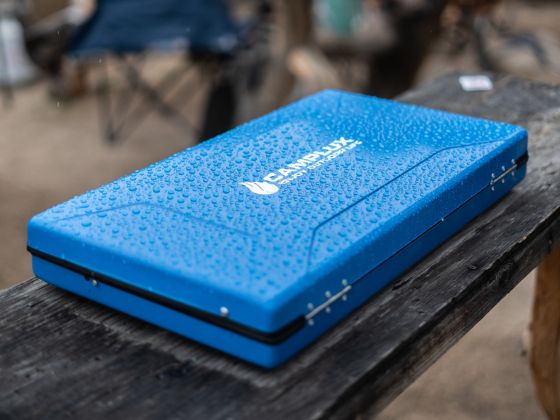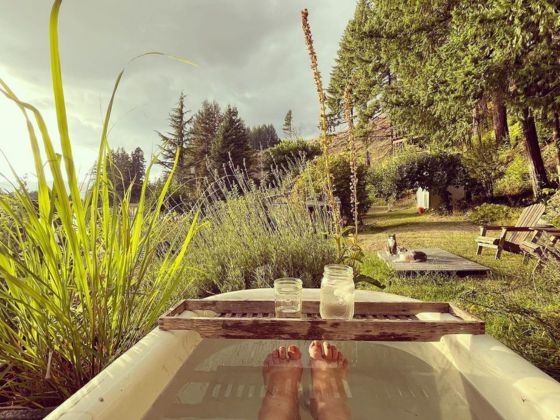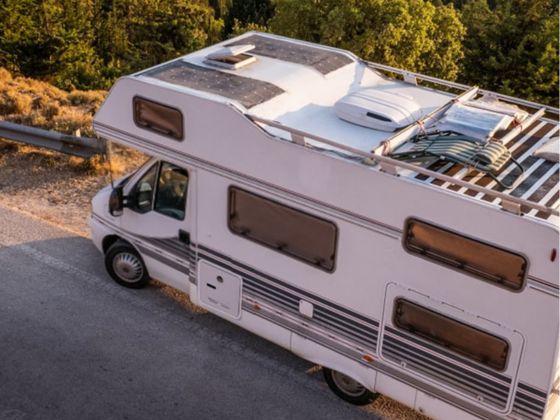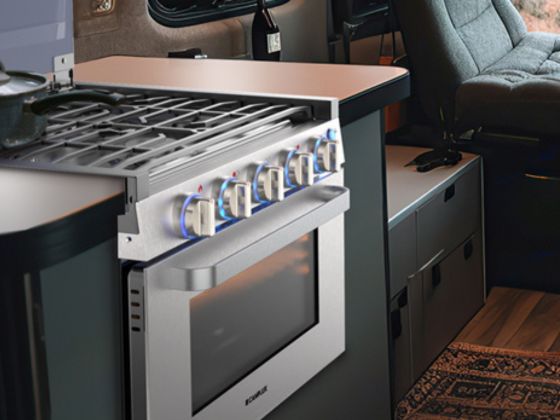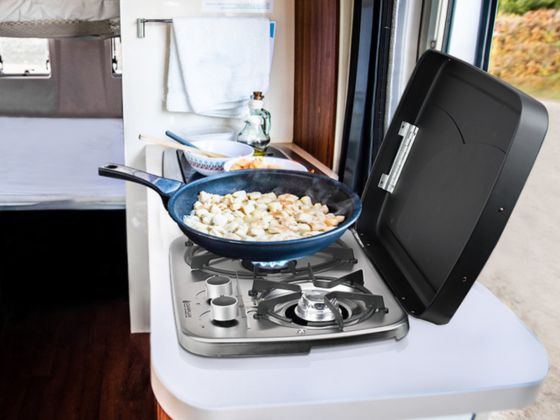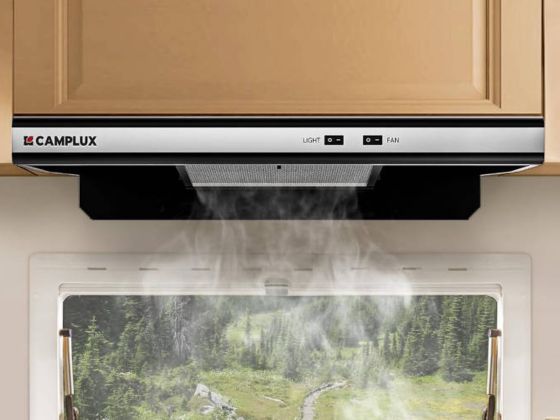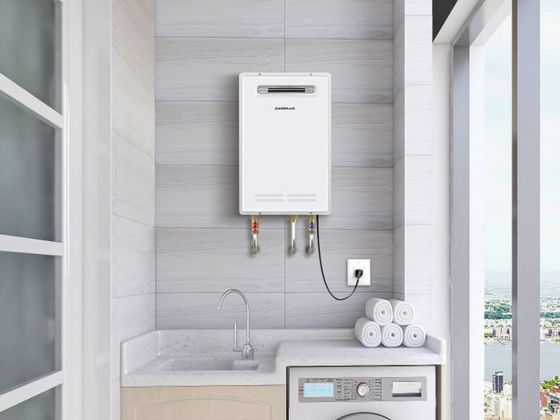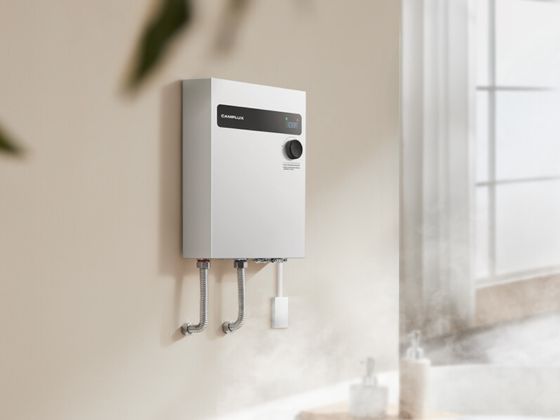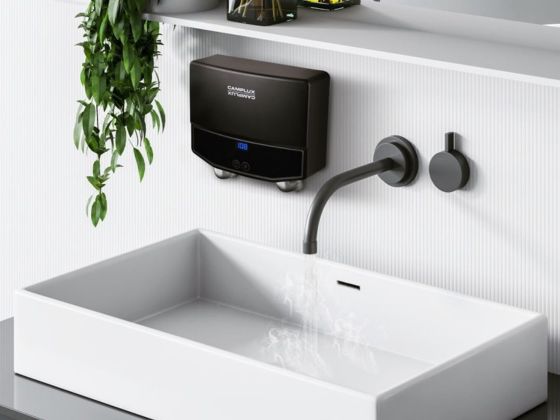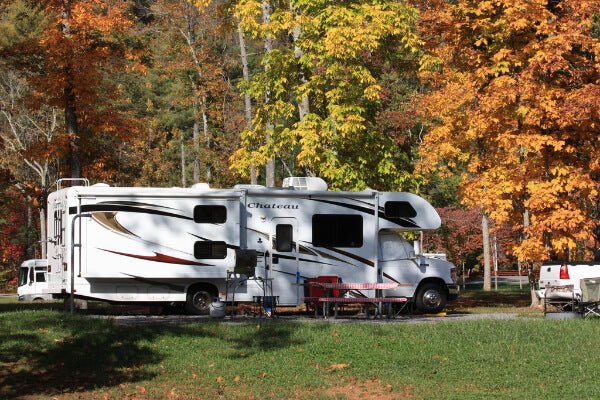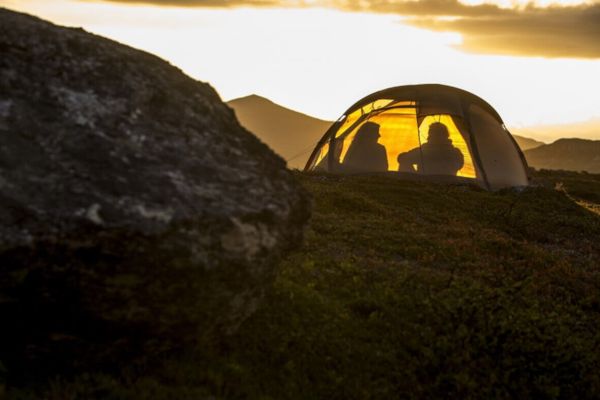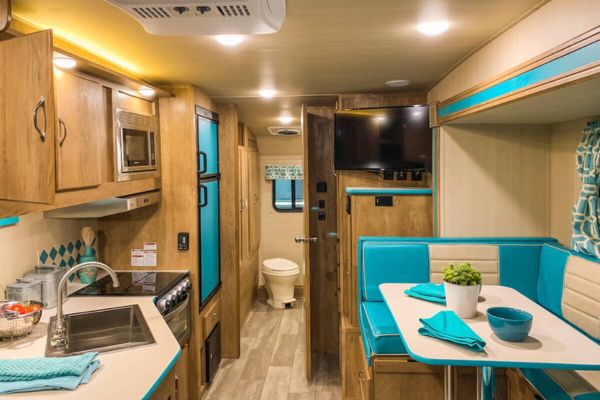When hitting the road in your recreational vehicle (RV), having a reliable source of hot water is essential for comfort and convenience. The choice between a traditional and a tankless water heater can significantly impact your RV experience. This article will guide you through the essentials of both types of water heaters, helping you understand their benefits and limitations, and ultimately assist you in making an informed decision that best suits your RV lifestyle.
Key Takeaways
- Understanding the differences between traditional and tankless RV water heaters is crucial for making an informed choice that aligns with your hot water needs and RV lifestyle.
- Traditional RV water heaters are known for their simplicity and lower upfront costs, but they may not provide the continuous hot water supply that a tankless system offers.
- Tankless RV water heaters deliver on-demand hot water and are generally more energy-efficient, but they come with higher initial costs and may require more complex installation.
- Both types of water heaters have specific maintenance requirements and durability factors, which should be considered alongside space constraints and technical considerations in your RV.
- Assessing your hot water usage patterns, energy consumption preferences, and long-term cost implications will help you determine the most suitable water heater for your RV adventures.
Understanding RV Water Heater Basics

The Role of Water Heaters in RVs
In the confined space of a recreational vehicle (RV), having access to hot water is not just a luxury, it's a necessity for comfort and hygiene. The water heater is a key component that provides this essential resource, allowing for activities such as cooking, cleaning, and bathing. Whether you're parked at a campsite or on the move, a reliable water heater ensures that these daily tasks can be performed with ease.
Water heaters in RVs operate on similar principles as those in residential homes but are designed to be compact and efficient to meet the unique demands of mobile living. They come in various capacities, typically ranging from 6 to 10 gallons for traditional models, and offer on-demand hot water in the case of tankless varieties.
Installation and operation of RV water heaters vary depending on the type. Here's a quick overview:
- Traditional water heaters store and heat water in a tank.
- Tankless water heaters heat water on demand, without storing it.
Tip: Regular maintenance of your RV water heater can significantly extend its lifespan and ensure consistent performance.
Comparing Traditional and Tankless Models
When choosing a water heater for your RV, the decision often comes down to selecting between traditional and tankless models. Each type offers distinct features that cater to different needs and preferences.
Traditional water heaters come with a storage tank that keeps a certain amount of water heated at all times. On the other hand, tankless water heaters provide hot water on demand by heating water directly as it flows through the device.
Here's a quick comparison to help you understand the key differences:
- Storage Capacity: Traditional heaters have a fixed capacity, while tankless models offer continuous supply.
- Recovery Rate: Tankless heaters typically have a faster recovery rate, meaning less waiting time for hot water.
- Energy Consumption: Tankless models are generally more energy-efficient as they only heat water when needed.
- Space: Traditional models require more space due to the tank, whereas tankless heaters are more compact.
Tip: Consider your RV's space and hot water needs when comparing these models. Tankless heaters are ideal for saving space and energy, but traditional heaters might be more suitable for those who need a large volume of hot water readily available.
Pros and Cons of Traditional RV Water Heaters

Advantages of Traditional Water Heaters
Traditional RV water heaters have stood the test of time, offering a range of benefits that make them a reliable choice for many RV enthusiasts. One of the primary advantages is their simplicity in design, which translates to ease of use and straightforward maintenance. These units typically have fewer electronic components, reducing the likelihood of malfunction and simplifying repairs.
- Cost-effectiveness* is another significant advantage. The initial purchase price of traditional water heaters is generally lower than their tankless counterparts. This makes them an attractive option for those on a budget or who prefer a more economical upfront investment.
Here's a quick rundown of the benefits:
- Lower initial cost
- Simpler design and operation
- Easier to repair due to fewer electronic parts
- Proven reliability over years of use
Tip: When considering a traditional water heater, remember that while the upfront cost is lower, you should also factor in the potential for higher long-term energy usage compared to tankless models.
Drawbacks of Traditional Water Heaters
While traditional RV water heaters have been the standard for many years, they come with certain limitations that may affect your travel experience. One of the primary drawbacks is the limited hot water supply. Traditional models store a finite amount of hot water, which can quickly be depleted with use, leading to inconvenient waiting periods for reheating.
Recovery time is another concern. After the hot water supply is exhausted, it can take a significant amount of time for the water to heat up again. This can be particularly problematic when multiple people need to shower back-to-back or when you require hot water for consecutive tasks.
Here's a quick overview of the key drawbacks:
- Limited hot water capacity
- Long recovery time
- More space required for installation
- Potential for standby heat loss
Tip: If you frequently find yourself running out of hot water or have a larger family, you might want to consider the tankless option for a continuous supply.
Benefits and Limitations of Tankless RV Water Heaters

Why Choose a Tankless Water Heater?
Tankless water heaters, also known as on-demand water heaters, offer a modern solution for RV owners seeking efficiency and convenience. Unlike traditional models, tankless units heat water as it flows through the device, providing a continuous supply of hot water. This means you'll never run out of hot water during back-to-back showers or while doing dishes.
Space-saving design is another significant advantage. Tankless water heaters are compact and can be installed in smaller spaces, freeing up room for other essentials in your RV. Here's a quick comparison:
- Traditional Water Heater: Requires significant space for the tank.
- Tankless Water Heater: Small, wall-mounted units that take up minimal space.
Tip: When considering a tankless water heater, remember that the initial cost may be higher, but the long-term savings and convenience can be well worth the investment.
In terms of energy efficiency, tankless water heaters only operate when hot water is needed, which can lead to lower energy consumption and reduced utility bills. This makes them an eco-friendly choice for the environmentally conscious traveler.
Potential Downsides of Going Tankless
While tankless RV water heaters offer continuous hot water and space savings, they are not without their drawbacks. One of the main concerns is the initial cost; tankless models tend to be more expensive upfront compared to traditional water heaters. Additionally, they can require significant modifications to your RV's existing plumbing and electrical systems, which can add to the overall expense.
Another potential downside is the inconsistent water temperature, especially when multiple outlets are in use simultaneously. This can result in a less comfortable experience, as the water may fluctuate between hot and cold. Moreover, tankless water heaters typically demand a higher flow rate to activate the heating element, which might not be ideal for RVs with limited water supply.
Installation complexity is another factor to consider. Tankless units often necessitate professional installation due to their sophisticated technology and the need for precise calibration. This not only adds to the cost but also means that DIY repairs are less feasible, potentially leading to higher maintenance costs over time.
Tip: Before opting for a tankless water heater, ensure that your RV's electrical system can handle the increased power demands, and consider the availability of professional installation services in your area.
Installation Considerations for RV Water Heaters

Space and Size Constraints
When selecting a water heater for your RV, the available space is a critical factor. Traditional water heaters come with a storage tank, which can take up considerable room. In contrast, tankless models are compact and can be a boon for smaller RVs where space is at a premium.
- Traditional Water Heater Dimensions:
- Height: 12-16 inches
- Width: 12-20 inches
- Depth: 18-24 inches
- Tankless Water Heater Dimensions:
- Height: 10-14 inches
- Width: 10-18 inches
- Depth: 3-10 inches
Tip: Before making a purchase, measure your RV's designated water heater compartment to ensure a proper fit. Consider not only the unit's dimensions but also the necessary clearance for ventilation and maintenance access.
Remember that the installation of a tankless water heater may free up space that can be repurposed for storage or other uses. However, it's essential to weigh this advantage against other factors such as cost, energy efficiency, and hot water needs.
Technical Requirements and Expertise
When installing an RV water heater, the technical requirements and expertise needed can vary significantly between traditional and tankless models. For traditional water heaters, a basic understanding of plumbing and electrical systems is usually sufficient. However, tankless water heaters often demand a more advanced skill set due to their complex heating mechanisms and digital control systems.
- Traditional Water Heater Installation:
- Basic plumbing skills
- Electrical wiring knowledge
- Familiarity with RV-specific constraints
- Tankless Water Heater Installation:
- Advanced plumbing and electrical skills
- Understanding of digital control systems
- Ability to adhere to strict manufacturer specifications
Tip: Always consult the manufacturer's manual for specific installation instructions and safety guidelines. If you're not confident in your technical abilities, hiring a professional is a wise investment to ensure proper installation and operation.
Remember that improper installation can lead to inefficiencies, malfunctions, or even safety hazards. It's crucial to assess your own expertise honestly or seek help from a qualified technician. The initial cost of professional installation could save you from expensive repairs or replacements down the line.
Energy Efficiency and Operating Costs
Comparing Energy Usage
When it comes to energy efficiency, both traditional and tankless RV water heaters have their merits, but they operate quite differently. Traditional models keep a set amount of water heated at all times, which can lead to energy waste when not in use. In contrast, tankless models heat water on demand, potentially offering energy savings.
Traditional Water Heaters:
- Constant energy use to maintain water temperature
- Less efficient during periods of inactivity
Tankless Water Heaters:
- Use energy only when hot water is needed
- More efficient over time, especially with frequent use
Tip: Regularly assessing your RV's energy consumption can help you optimize the efficiency of your water heater, regardless of the type.
Ultimately, the choice between traditional and tankless water heaters may come down to your specific energy usage patterns and preferences. While tankless models may offer efficiency gains, they often come with a higher initial cost. It's important to weigh the long-term energy savings against the upfront investment.
Long-Term Cost Implications
When considering the long-term cost implications of RV water heaters, it's essential to look beyond the initial purchase price. Traditional water heaters may have a lower upfront cost, but their energy consumption over time can add up, especially if you frequently use hot water. In contrast, tankless models, while more expensive initially, often lead to lower operating costs due to their on-demand heating capability.
Operating costs are not the only factor; maintenance and replacement costs must also be considered. Traditional water heaters typically have a shorter lifespan and may require more frequent maintenance or replacement parts. Below is a simplified cost comparison over a 10-year period:
| Year | Traditional Water Heater Costs | Tankless Water Heater Costs |
|---|---|---|
| 1 | $500 | $800 |
| 5 | $700 | $800 |
| 10 | $1,000 | $800 |
Tip: Always factor in the efficiency and durability of the water heater when calculating long-term costs. A more efficient and durable unit can save money and hassle over time.
Ultimately, the decision should be based on a thorough analysis of both immediate and long-term expenses, including the cost of energy, maintenance, and potential replacements. By considering these factors, you can make an informed choice that aligns with your budget and RV lifestyle.
Maintenance and Durability

Maintenance Demands of Traditional vs. Tankless
When considering the maintenance demands of an RV water heater, it's important to understand that both traditional and tankless models come with their own set of requirements. Traditional water heaters typically involve more frequent maintenance due to the presence of a tank. Sediment buildup can occur over time, necessitating periodic flushing to maintain efficiency and prevent damage.
In contrast, tankless water heaters often boast a lower maintenance profile. Without a tank to accumulate sediment, these units generally require less attention. However, they are not maintenance-free. It's crucial to periodically check the filters and perform descaling procedures to ensure optimal performance. Below is a list highlighting key maintenance aspects for each type:
-
Traditional Water Heaters:
- Anode rod inspection and replacement
- Tank flushing to remove sediment
- Checking and replacing heating elements
- Regular inspection of seals and valves
-
Tankless Water Heaters:
- Filter cleaning or replacement
- Descaling to prevent mineral buildup
- Monitoring of water flow sensors
- Occasional checks of the ignition system
Tip: Regardless of the type, regular maintenance is essential for prolonging the life of your water heater and ensuring it operates at peak efficiency. Always refer to the manufacturer's guidelines for specific maintenance recommendations.
Expected Lifespan and Reliability
When considering the expected lifespan and reliability of RV water heaters, it's important to recognize that both traditional and tankless models come with their own set of expectations. Traditional water heaters typically have a lifespan of 6 to 10 years, while tankless models can often exceed 10 years due to fewer moving parts and reduced risk of corrosion.
- Traditional RV Water Heaters:
- Average lifespan: 6-10 years
- Reliability influenced by tank condition and maintenance
- Tankless RV Water Heaters:
- Average lifespan: Over 10 years
- Higher reliability due to less wear and tear
Maintenance is key to ensuring the longevity of any water heater. Regular check-ups can prevent the buildup of sediment and corrosion, which are common culprits of water heater failures. It's also crucial to winterize your water heater if your RV will be exposed to freezing temperatures.
Tip: Always follow the manufacturer's guidelines for maintenance and use only recommended parts for repairs to maintain optimal performance and extend the life of your water heater.
Making the Decision: Which Water Heater Suits Your RV Lifestyle?
Assessing Your Hot Water Needs
Before deciding on a water heater for your RV, it's crucial to assess your hot water needs. Consider the number of people using the RV and your typical water usage patterns. Do you frequently take long showers, or are quick rinses more your style? Are you often cooking or washing dishes? These habits will determine the capacity and recovery rate you'll need from your water heater.
- Daily Hot Water Usage Estimation *
- One person: 20 gallons
- Two people: 40 gallons
- Family of four: 80 gallons
Tip: If you're unsure about your water usage, monitor your consumption over a week during regular RV use to get a better idea.
Remember, a traditional water heater with a tank may require a longer recovery time between uses, which could be a limitation if multiple people need to shower back-to-back. On the other hand, a tankless model provides continuous hot water, which may be more suitable for higher usage demands. Ultimately, the goal is to match your water heater to your lifestyle to ensure comfort and convenience on the road.
Lifestyle Considerations and Final Thoughts
When making the final decision on the right RV water heater, consider how your lifestyle and travel habits will interact with your choice. Do you frequent campsites with full hookups, or do you prefer the freedom of boondocking? Your answer could sway your decision towards a traditional or tankless model.
- Full Hookups: Traditional water heaters may suffice due to constant access to electricity and water.
- Boondocking: Tankless water heaters are ideal for conserving water and energy.
Tip: Always consider the balance between comfort and practicality. A water heater that saves energy but doesn't meet your hot water needs can detract from your RV experience.
In conclusion, the decision between a traditional and tankless RV water heater is not just about the specs; it's about how the heater fits into your RV lifestyle. Weigh the pros and cons, reflect on your travel patterns, and choose a water heater that will provide reliability and comfort on the road.
Conclusion: Making the Informed Choice
In the quest for the perfect RV water heater, the choice between traditional and tankless models boils down to personal preference, budget, and specific travel needs. Whether you prioritize endless hot water supply with a tankless system or the tried-and-true simplicity of a traditional water heater, both options have their merits. It's essential to weigh the pros and cons, consider the long-term costs, and understand the installation requirements. By doing so, you'll ensure that your selection not only provides comfort and convenience on the road but also aligns with your RV lifestyle.
Frequently Asked Questions
What are the main differences between traditional and tankless RV water heaters?
Traditional RV water heaters store and heat water in a tank, while tankless models heat water on demand without storing it. Traditional heaters have a limited supply of hot water based on tank size, whereas tankless heaters provide a continuous supply but require more power to operate instantly.
How do I know if a traditional or tankless water heater is better for my RV?
Consider your hot water needs, space and weight constraints, energy efficiency preferences, and budget. Traditional water heaters are typically more affordable and easier to install, while tankless heaters are more compact and provide endless hot water but at a higher initial cost.
Are tankless RV water heaters more energy-efficient than traditional ones?
Tankless RV water heaters can be more energy-efficient because they only heat water when needed, eliminating standby energy loss associated with traditional tank heaters. However, they may require more power during operation, so overall efficiency depends on usage patterns.
What should I consider regarding installation when choosing an RV water heater?
Consider the size and space available in your RV, the compatibility with existing plumbing and power sources, and whether you have the technical skills or need professional installation. Tankless heaters often require more complex installation and may need modifications to your RV.
How often do RV water heaters need maintenance?
Maintenance frequency can vary based on the model and usage, but traditional water heaters typically require annual maintenance to check the anode rod, flush the tank, and inspect for leaks or corrosion. Tankless water heaters generally have less frequent maintenance but may require professional servicing.
Can I replace my RV's traditional water heater with a tankless model?
Yes, you can replace a traditional water heater with a tankless model, but it may involve significant changes to the plumbing, venting, and electrical systems. Ensure you have the right specifications and consider hiring a professional to ensure a safe and compliant installation.

